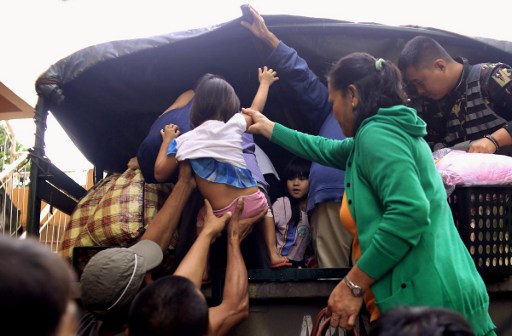
Residents are assisted into a truck after the local government implemented preemptive evacuations at Barangay Matnog, Daraga, Albay province on December 25, 2016, due to the approaching typhoon Nina (int’l name Nock-Ten). / AFP PHOTO
Babies, toddlers and old people were loaded onto military trucks in the Philippines on Sunday as thousands fled from the path of a powerful typhoon barrelling towards the disaster-prone archipelago.
Officials warned that storm surges up to 2.5-meters (eight-feet) high, landslides and flash floods posed the biggest threats as Nock-Ten closed in on the Bicol peninsula and nearby islands.
The typhoon threat, on one of the biggest holidays in the mainly Christian nation, triggered preemptive evacuations that officials said could involve hundreds of thousands of people.
“We went around with megaphones and gave instructions to our people to eat breakfast, pack and board the military trucks,” Alberto Lindo, an official of Alcala, a farming village of 3,300 people near the active Mayon volcano, told AFP.
About 100 babies, toddlers, parents and elderly people were the first to be trucked off to a school some seven kilometers (four miles) away as strong winds began to shake trees at midday, scattering leaves on the pavement.
“There are large ash deposits on the slopes (of Mayon). Heavy rain can dislodge them and bury our homes in mud,” Lindo added.
Philippine and international weather services said Nock-Ten, named after a bird found in Laos, was set to hit Bicol on the south of the main island of Luzon on Sunday evening.
The US Joint Typhoon Warning Center has forecast sustained winds of 231 kilometers (144 miles) an hour and gusts of 278 km when Nock-Ten makes landfall on the now-isolated island of Catanduanes, home to 250,000 people.
The typhoon will eventually affect an area of nearly 42 million people, including the capital Manila which was forecast to be hit on Monday.
Civil defense officials in Bicol said earlier nearly half a million people in the region were in harm’s way and needed to be evacuated.
The government called for preemptive evacuations in the area on Saturday, with nearly 4,000 residents moving into emergency centers and more than 8,000 others seeking shelter elsewhere, an official tally said.
Evacuations were continuing on Christmas Day as the military and local governments sent trucks to evacuate coastal communities and other areas hit by landslides or flash floods in previous storms.
Some 20 typhoons or lesser storms strike the Philippines each year, routinely killing hundreds of people, and Bicol is often the first region to be hit.
It prides itself on having honed its disaster response to minimize casualties.
“We have recalled all of our first responders from vacation. They will be on 24-hour standby and on call for rescues or support,” Rachel Miranda, spokeswoman for the region’s civil defense office, told AFP.
Nock-Ten, which will arrive outside the normal typhoon season, disrupted celebrations of one of the most important holidays in the mainly Catholic country’s religious calendar, with all ferry services and commercial flights in Bicol suspended.
Some of the thousands of commuters stranded at dozens of ports that were closed for the typhoon spent the night inside evacuation centers on Saturday.
After Bicol, Nock-Ten is forecast to strike the heavily populated heartland of the main island of Luzon including Manila.
Rescue workers in the capital have been put on standby, evacuation centers opened and food and other rations stocked.
The coastguard on Sunday ordered the beaches south of Manila to be cleared of holidaymakers by Monday, while residents of the capital’s seaside slums were warned to leave their homes.
Mammoth tsunami-like sea waves devastated the city of Tacloban and nearby areas when super typhoon Haiyan struck the central Philippines in November 2013, leaving 7,350 people dead or missing.